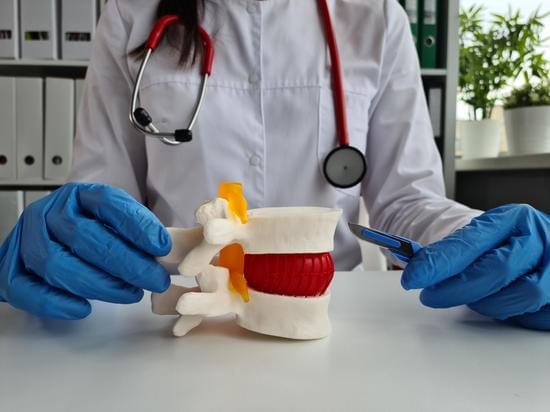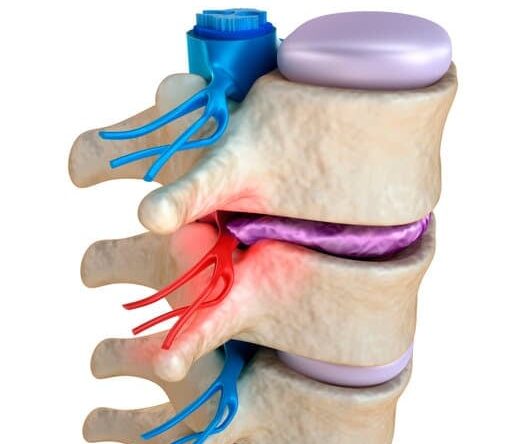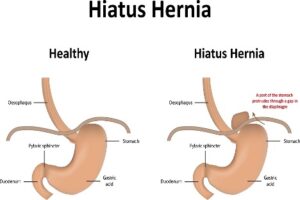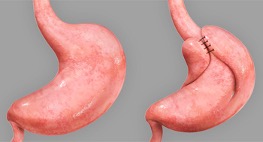Explore various treatment choices available for managing hiatus hernia, including surgical and non-surgical approaches.
Do you often feel discomfort or pain after enjoying a meal? It might be more than just indigestion – it could be a hiatus hernia. In this article, we’ll explore what this condition is, its causes, warning signs, and the range of treatments available. If you suspect you have a hiatus hernia, consulting with the best laparoscopic & bariatric surgeon can help you determine the most effective treatment approach for your specific case.
In this detailed guide, we’ll cover the key warning signs to watch for and break down the treatment options, from lifestyle adjustments and medications to surgical interventions. You’ll learn about the benefits and drawbacks of each approach, helping you make informed decisions about your care.



A hiatus hernia occurs when part of the stomach pushes up into the chest through an opening in the diaphragm. This can lead to symptoms like heartburn, chest pain, trouble swallowing, and regurgitation. While more common in those over 50, it can affect people of any age. Factors such as obesity, smoking, and certain medical conditions increase the risk of developing a hiatus hernia. Consulting the best laparoscopic & bariatric surgeon is crucial to identify these factors and determine the best course of action for treatment.
Don’t ignore persistent symptoms. Early diagnosis and the right treatment can ease discomfort and reduce the risk of complications. The best laparoscopic & bariatric surgeon can guide you through the process and ensure you receive the best care possible. Read on to gain valuable insights into hiatus hernia and take charge of your health with confidence.
A hiatus hernia occurs when part of the stomach pushes through the diaphragm into the chest cavity, often leading to uncomfortable symptoms like heartburn, regurgitation, or chest pain. This condition develops due to a weakening of the diaphragm, the muscle that separates the chest from the abdomen. Several factors contribute to this weakening, such as age-related muscle deterioration, chronic coughing, or excessive straining during bowel movements. Lifestyle choices, including smoking, poor posture, and excessive weight gain, can also increase abdominal pressure, raising the risk of developing a hiatus hernia. Consulting the best laparoscopic & bariatric surgeon can help you determine the right course of treatment and identify potential lifestyle changes to reduce risk.
Medical conditions such as chronic constipation, pregnancy, and connective tissue disorders like scleroderma play a significant role in the development of hiatus hernia. Genetics may also influence susceptibility, making some individuals more prone to this condition. Obesity is a leading risk factor, as the additional abdominal weight increases pressure on the stomach and diaphragm. Understanding these causes emphasizes the importance of maintaining a healthy lifestyle. Early diagnosis and intervention are crucial, and working with the best laparoscopic & bariatric surgeon ensures the most effective management of this condition to prevent further complications.
A hiatus hernia occurs when part of the stomach pushes up into the chest through the diaphragm. There are two main types of hiatus hernia: sliding and para esophageal. The most common type is the sliding hiatus hernia, where the junction between the stomach and esophagus slides upward into the chest. This can cause symptoms such as acid reflux, heartburn, and regurgitation. It is typically mild and may not require surgical treatment unless symptoms become more severe or persistent. If you’re experiencing these symptoms, consulting with the best laparoscopic & bariatric surgeon can help determine whether surgery is necessary.


The second type is the para esophageal hiatus hernia, which is less common but potentially more serious. In this type, part of the stomach pushes through the diaphragm alongside the esophagus, while the junction between the stomach and esophagus remains in place. Although this type may not cause immediate symptoms, it can lead to complications such as strangulation of the stomach, which restricts blood flow and requires urgent surgery. Identifying the type of hiatus hernia is crucial for determining the right treatment plan. Consulting the best laparoscopic & bariatric surgeon can ensure that you receive timely and effective care to avoid complications and improve your overall health.
Hiatus hernia often goes unnoticed, but it can present several warning signs that should not be ignored. One of the most common symptoms is heartburn, where stomach acid leaks into the esophagus, causing a burning sensation in the chest. People with a hiatus hernia may also experience regurgitation, the sensation of food or liquid coming back up into the mouth. Difficulty swallowing, or dysphagia, is another key symptom, along with chest pain that can sometimes be mistaken for heart-related issues. These symptoms are often more pronounced after eating or when lying down, making them particularly noticeable following meals. Consulting the best laparoscopic & bariatric surgeon can help in understanding these symptoms and finding the right treatment for your condition.
In addition to the more common symptoms, some individuals with a hiatus hernia may suffer from bloating, nausea, and a feeling of fullness even after eating small amounts of food. If left untreated, the condition can lead to more severe complications such as esophageal ulcers or bleeding. If you experience any combination of these symptoms, it’s crucial to seek medical advice. Consulting with the best laparoscopic & bariatric surgeon can ensure an accurate diagnosis and help in managing the condition effectively. Early identification of a hiatus hernia can lead to better management of symptoms and a reduced risk of more serious health problems.
Diagnosing a hiatus hernia typically starts with a comprehensive evaluation of your symptoms and medical history. If a hiatus hernia is suspected, your healthcare provider may recommend a series of diagnostic tests to confirm the condition. One of the most common tests is an upper gastrointestinal (GI) series, also known as a barium swallow. During this test, you will drink a contrast material (barium) that highlights the esophagus and stomach on X-ray images, allowing doctors to detect any abnormalities, including a hernia. For a more detailed examination, an endoscopy may be performed, where a thin, flexible tube with a camera is inserted through the mouth to examine the inside of the stomach and esophagus directly.
In certain cases, if additional information is necessary, a doctor may suggest a pH monitoring test to assess acid reflux or a manometry test to evaluate the movement and pressure in the esophagus. These diagnostic tools help determine the extent of the hernia and any related complications, such as gastroesophageal reflux disease (GERD). A proper diagnosis is essential for creating an effective treatment plan. Consulting the best laparoscopic & bariatric surgeon ensures that the diagnosis is accurate and that the most appropriate treatment options are explored. With the right specialist, you can receive the highest level of care tailored to your specific condition.
Managing a hiatus hernia often requires making lifestyle changes that can alleviate symptoms and prevent further complications. One of the most effective adjustments is modifying your diet. Eating smaller, more frequent meals throughout the day, rather than large meals, can help prevent the stomach from becoming too full and pressing against the diaphragm. Avoiding foods and drinks that trigger acid reflux, such as spicy dishes, caffeine, alcohol, and citrus, can also play a key role in symptom management. Moreover, it’s crucial to avoid eating right before bed, as lying down after a meal can worsen reflux and discomfort. If symptoms persist, seeking advice from the best laparoscopic & bariatric surgeon can help you explore additional options for relief.
Incorporating regular physical activity is another important aspect of managing a hiatus hernia. Staying active helps maintain a healthy weight, reducing pressure on the abdomen and decreasing the chances of aggravating the condition. However, it’s vital to avoid exercises that put strain on the abdominal area, such as heavy lifting, as these activities can increase intra-abdominal pressure. Instead, focusing on low-impact exercises like walking, swimming, or yoga can support overall health without aggravating the hernia. For personalized treatment strategies, consulting the best laparoscopic & bariatric surgeon can provide expert guidance and help individuals manage their condition effectively, reducing the likelihood of more severe symptoms.
When it comes to treating a hiatus hernia, medications are essential for managing symptoms and preventing complications. The most commonly prescribed medications are proton pump inhibitors (PPIs) and H2-receptor antagonists, which work by reducing stomach acid production. By lowering acid levels, these drugs help alleviate symptoms like heartburn and acid reflux, which are common in individuals with a hiatus hernia. For quick relief from mild heartburn, antacids may also be recommended, as they neutralize stomach acid and provide temporary comfort. If symptoms are more severe, medications like prokinetics may be prescribed to improve the movement of food through the stomach and esophagus, helping to reduce reflux episodes.
In more complex cases, the best laparoscopic & bariatric surgeon may prescribe additional treatments. For example, sucralfate forms a protective barrier over the stomach lining to prevent acid damage. If an infection or complications like gastritis are involved, antibiotics may be recommended. While medications can significantly reduce discomfort and improve quality of life, they should be paired with lifestyle modifications, such as weight management, dietary changes, and avoiding known triggers, for better long-term results. It’s important to understand that while medications can manage symptoms, they don’t address the hernia itself, and in some cases, surgery performed by a best laparoscopic & bariatric surgeon may be necessary for more severe conditions.

When conservative treatments like lifestyle changes and medication fail to manage the symptoms of a hiatus hernia, surgery may be the next step. One of the most common surgical procedures for this condition is fundoplication, which involves wrapping the top of the stomach around the lower esophagus to prevent acid reflux. This procedure can be performed through traditional open surgery or laparoscopically, with the latter being minimally invasive and offering a quicker recovery time. For the best outcomes, it’s important to consult with the best laparoscopic & bariatric surgeon, as they have the expertise to perform the surgery with precision, minimizing risks and ensuring a faster recovery.
In some cases, hiatus hernia surgery may be necessary to correct the hernia itself. During this procedure, the part of the stomach that has pushed through the diaphragm is repositioned back into the abdomen, and the diaphragm is tightened to prevent recurrence. While surgical options are generally safe, they do come with potential risks. It’s essential to work with the best laparoscopic & bariatric surgeon who can assess your condition and guide you through the decision-making process, ensuring that you understand the risks and benefits of surgery. Ultimately, the decision to undergo surgery should be based on the severity of symptoms, the risk of complications, and the patient’s overall health.
Alternative and complementary therapies can offer relief for individuals managing hiatus hernia symptoms, though they should be used alongside traditional medical treatments. Some individuals find that acupuncture helps reduce discomfort related to heartburn and digestive issues by stimulating specific points in the body to promote energy flow and balance. Herbal remedies, such as chamomile, ginger, and licorice root, may also soothe the digestive system, reduce inflammation, and improve gut health. However, it is crucial to consult with a healthcare provider or the best laparoscopic & bariatric surgeon before incorporating these therapies to ensure they are safe and effective for your specific condition.
Lifestyle changes can further complement medical treatments. Stress-reduction techniques like yoga or meditation can help alleviate stress, which may worsen symptoms of hiatus hernia. Other strategies, such as eating smaller, more frequent meals, avoiding trigger foods, and elevating the head of the bed at night, are practical methods that some individuals find helpful in managing symptoms. While alternative therapies can offer symptom relief, they should never replace conventional medical care. Instead, they should be used to enhance overall well-being, in consultation with the best laparoscopic & bariatric surgeon, to improve the quality of life for those living with a hiatus hernia.
Living with a hiatus hernia can be challenging, but with the right approach, individuals can manage the condition and maintain a normal, healthy life. While some may experience mild symptoms, others may suffer from more significant discomfort, such as heartburn or difficulty swallowing. Making lifestyle adjustments—such as eating smaller meals, avoiding certain foods, and managing stress—can help alleviate symptoms. Additionally, regular monitoring and avoiding factors that worsen the condition, like smoking or obesity, can further contribute to better management. In many cases, treatment options, including medications or surgery, can provide significant relief and enhance quality of life. Consulting with the best laparoscopic & bariatric surgeon can ensure the most effective treatment plan is followed, offering lasting results.
Seeking medical advice is vital for anyone experiencing symptoms of a hiatus hernia. Early diagnosis can help prevent complications, and a healthcare provider can guide you toward the best treatment options based on the severity of your condition. It’s especially important to consult with the best laparoscopic & bariatric surgeon before making significant lifestyle changes or opting for surgery. With the right care and proper management strategies, individuals with a hiatus hernia can effectively control their symptoms, leading to a more comfortable, healthy life.
Schedule your appointment quickly and easily with just a few clicks.




Prof. Dr. Ahmed Hassn is a UK trained highly qualified Best Laparoscopic & Bariatric Surgeon with more than 21 years of consultant experience in his field.
Don’t miss our future updates! Get Subscribed Today!
©2024. Prof. Dr. Ahmed Hassn. All Rights Reserved.